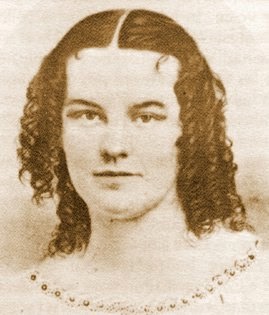"Look at that girl! I’d kill myself if I looked like that!" It was meant as a whisper, but Asenath Martyn heard it anyway. She knew what she looked like: she had a hunched back and a scar across her mouth, the result of abuse from a mother who was now dead. Sene, as she was known, knew something was wrong with her simple life, living with her father in Lawrence,
Massachusetts, and working for the Pemberton Mills. She loved a boarder in their home, Richard "Dick" Cross, and the two had become engaged. She had learned, however, that Cross intended to marry her only out of pity, and that he really loved Sene's friend, the pretty Del Ivory (who "counted her rejected lovers by the score"). In this case, however, Del loved Dick back.
Such is the narrative in "The Tenth of January," a short story by
Elizabeth Stuart Phelps, set in late 1859 and early 1860, but published in the
Atlantic Monthly for
March 1868. It was later collected in
Men, Women, and Ghosts in 1869. What Sene and the other characters did not know, but contemporary readers certainly did, was that the real story would come to its climax on the titular date, January 10, 1860, when everyone would be killed in one of the most horrific industrial accidents in the history of the United States.
When the
Pemberton Mills collapsed without warning that day, its five stories turned to rubble within a minute or so, an estimated 500 to 750 were inside — in addition to the scores that died (some charred beyond recognition), survivors were mangled or cut to pieces. Most of the victims were young girls. Charitable donations to their families amounted to $4000 within two days. In fact, on the list of victims, an "Asenath Martin" was marked as unrecovered or unidentified. Phelps describes the scene in her fictional account:
A network twenty feet high, of rods and girders, of beams, pillars,
stairways, gearing, roofing, ceiling, walling; wrecks of looms, shafts,
twisters, pulleys, bobbins, mules, locked and interwoven; wrecks of
human creatures wedged in; a face that you know turned up at you from
some pit which twenty-four hours' hewing could not open; a voice that
you know
crying after you from God knows where; a mass of long, fair hair
visible here, a foot there, three fingers of a hand over there; the snow
bright-red under foot; charred limbs and headless trunks tossed about;
strong men carrying covered things by you, at sight of which other
strong men have fainted; the little yellow jet that flared up, and died
in smoke, and flared again, leaped out, licked the cotton-bales, tasted
the oiled machinery, crunched the netted wood, danced on the heaped-up
stone, threw its cruel arms high into the night, roared for joy at
helpless firemen, and swallowed wreck, death, and life together out of
your sight, — the lurid thing stands alone in the gallery of tragedy.
But Sene, Del, and Dick did not know any of this was coming. Sene had been secretly struggling with what to do about Dick; she knew it was best to cut off the engagement so that he and Del could be happy together. But that meant sacrificing her own happiness, or as little of it as she had anyway. But Phelps narrates that, "Asenath was no heroine, you see." On the morning of January 10, however, she had made a decision which left her unburdened (presumably, she would give up on Dick, but the text is not clear at this point).
She goes to work, feeling more and more settled in her decision, more at peace with God and her disfigurement... when disaster strikes. Phelps tells us that the telegraph cables spread the message far and wide, that people were swept up in the
horrible news... at least temporarily, before going back to their own lives. But what of the people of Lawrence and the Pemberton Mills? What of Asenath Martyn, her father, her lover, and her friend?
One that we love may go upon battle-ground, and we are ready for the worst: we have said our goodbys; our hearts wait and pray: it is his life, not his death, which is the surprise. But that he should go out to his safe, daily, commonplace occupations, unnoticed and uncaressed, — scolded a little, perhaps, because he leaves the door open, and tells us how cross we are this morning; and they bring him up the steps by and. by, a mangled mass of death and horror,— that is hard.
Today, and in her own lifetime, Elizabeth Stuart Phelps was best known for her 1868 novel
The Gates Ajar and its sequels. There is no doubt in my mind, however, that "
The Tenth of January" should be remembered today as one of her most powerful, most well-written, and most emotionally moving works. Her talents are on full display here: in descriptions of the town, in the relatable feelings of uncertainty in the lead character, the harrowing descriptions from inside the collapsed structure, and the gut-wrenching realism of its aftermath (not to mention the tantalizing ending). Though long for a short story, it can be read in one sitting. I can't recommend enough that today's readers take the time to do so.



















